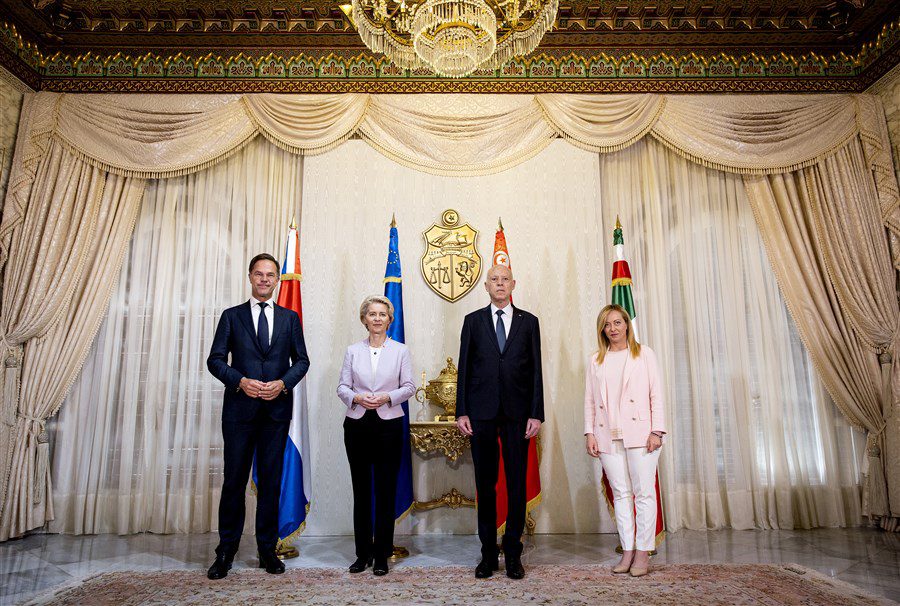
EU leaders, standing from left to right: Prime Minister Mark Rutte, President von der Leyen, President Kais Saied, and Prime Minister Giorgia Meloni met in Tunisia, July 11th, to discuss partnerships impacting migration.
Leaked documents from the German Federal Foreign Office this week have revealed German disquiet over being excluded from the European Commission’s recent migration deal with Tunisia, which was in part brokered by Italian Prime Minister Giorgia Meloni.
In July, European Commission President Ursula von der Leyen accompanied Meloni and Dutch Prime Minister Mark Rutte to Tunis to sign a Memorandum of Understanding with Tunisian President Kais Saied to curtail the flow of illegal immigration and repatriate migrants in exchange for greater EU aid and investment.
Today, the🇪🇺@EU_Commission &🇹🇳#Tunisia agreed on a Memorandum of Understanding on a comprehensive partnership package focusing on:
— EU Neighbourhood & Enlargement 🇪🇺 (@eu_near) July 16, 2023
📈macro-economic stability
🌍trade & investments
⚡️green energy transition
🤝people-to people contacts
🧳migration
More ➡️ https://t.co/qJ9iLkgyYo pic.twitter.com/oouxSk5GVP
The Tunisian deal builds on previous diplomatic outreach conducted by Meloni and her government to shore up relations with North African governments as Rome looks to project its regional influence in the areas of migration control and energy security.
According to an internal Federal Foreign Office briefing, Germany and 12 other member states were not properly consulted on the rapid-fire agreement with Tunisia. The briefing also claimed that the European Council, regarded as the primary forum for national governments in Brussels, was similarly ignored in the process.
Germany’s Federal Foreign Office is headed by Green Party hardliner Annalena Baerbock, who views the Tunisian deal as a breach of the rule of law and not going far enough in opening migration routes for Tunisians into Europe.
The briefing goes on to say that it was improper for the agreement to be signed with the Tunisian government, without the approval of the Council or member states, with less than five weeks’ notice given.
The Tunisian deal has also seemingly angered the EU’s diplomatic service, the European External Action Service, with diplomats from France, Austria, Belgium, and Greece feeling disrespected by the decision to sign on the dotted line before proper consultation.
Despite the criticism, the effectiveness of the agreement is already in doubt, with Tunisia’s President Kais Saied declaring that his nation would not become Europe’s “border guard” and that his country would only repatriate Tunisians who crossed into the EU illegally and not Sub-Saharan Africans.
Tunisia has been experiencing a wave of racial violence against Sub-Saharan migrants who have settled in the country, which is a transit point into Europe by the precarious Mediterranean Sea route.
Western human rights groups are increasingly directing their ire against Tunisia, as state officials have confirmed reports of African migrants being left stranded in the Libyan desert after deportation by Tunisian security services.
The Tunisian economy has been largely stagnant since the Arab Spring revolution in 2011, with the domestic tourist industry hit hard by terrorist attacks against European tourists in 2015. Some pundits believe the influx of migrants has tipped the country over the social and economic edge and provided the Tunisian government with an easy scapegoat.
Tunisian President Kais Saied attracted international scorn earlier this year by endorsing an Arab equivalent of the Great Replacement Theory, alleging that international elites were conspiring to flood his nation with immigrants.
Tunisia and the European Union have a lot to offer each other. That’s why President @vonderleyen 🇪🇺, Prime Minister @GiorgiaMeloni 🇮🇹 and I visited President Kais Saied (@TnPresidency) and Prime Minister Najla Bouden (@KasbahTn) in Tunisia today. We discussed a broad partnership… pic.twitter.com/vn7Fe75BiA
— Mark Rutte (@MinPres) June 11, 2023
